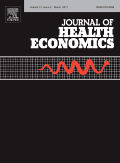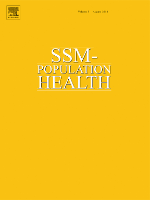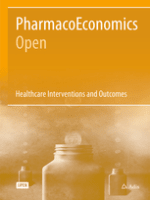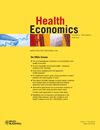
JOURNAL OF HEALTH ECONOMICS
Scope & Guideline
Elevating Health Systems through Rigorous Economic Analysis
Introduction
Aims and Scopes
- Health Policy Analysis:
The journal extensively covers research that evaluates the impact of health policies, such as the Affordable Care Act, Medicaid expansions, and other governmental interventions on health outcomes and economic metrics. - Economic Evaluations of Health Interventions:
Studies often include cost-effectiveness analyses of health programs, interventions, and treatments, assessing their economic viability and potential return on investment. - Social Determinants of Health:
Research frequently explores how socioeconomic factors, such as income, education, and access to care, influence health outcomes and inequalities. - Behavioral Economics in Health:
The journal incorporates behavioral insights into health decision-making, examining how incentives and information affect health behaviors and choices. - Longitudinal and Cross-Sectional Studies:
Methodologically, the journal publishes both longitudinal and cross-sectional studies that provide insights into long-term health trends and the immediate effects of health policies. - Interdisciplinary Approaches:
The journal encourages interdisciplinary research that combines economics with public health, sociology, and psychology to provide a holistic view of health issues.
Trending and Emerging
- Health Equity and Disparities:
Recent issues highlight a growing emphasis on research that tackles health disparities across different demographics, including race, gender identity, and socioeconomic status, showcasing the journal's commitment to health equity. - Impact of Policy Interventions:
There is an increasing focus on evaluating the unintended consequences and effectiveness of various health policy interventions, indicating a trend towards more nuanced analyses of policy impacts. - Mental Health Economics:
Recent publications have increasingly addressed mental health issues, reflecting a broader recognition of mental health as a critical component of overall health economics. - Long-Term Effects of Early Health Interventions:
Emerging studies are focusing on the long-term economic impacts of early-life health interventions, linking childhood health to adult economic outcomes. - Utilization of Technology in Health Care:
The journal is beginning to publish more research on the economic implications of technology adoption in healthcare, including telehealth and digital health interventions, as these technologies become more prevalent. - Interdisciplinary Approaches to Health Issues:
There is a notable trend towards interdisciplinary research that integrates insights from economics with other fields such as public policy, sociology, and psychology, enriching the analysis of health issues.
Declining or Waning
- Focus on Traditional Economic Models:
There is a noticeable decline in papers strictly adhering to traditional economic models without incorporating contemporary issues such as social determinants or behavioral economics. - Research on Non-Medical Determinants of Health:
While some studies still address non-medical factors, there seems to be less frequent publication of research solely focused on these areas compared to previous years. - Economic Impact of Global Health Issues:
Research that focuses on global health economics, particularly in low-income countries, has seen a reduction, possibly due to a shift towards more localized or specific health policy evaluations. - Overemphasis on Opioid Crisis Studies:
Although opioid-related research has been significant, there appears to be a waning interest in repetitive studies focusing solely on opioid misuse, as the field matures and diversifies. - Single-Disease Focus:
Research concentrating on single diseases or conditions without integrating broader health system impacts is becoming less common, as the journal increasingly emphasizes holistic and system-wide approaches.
Similar Journals

Health Policy OPEN
Transforming health policy insights into actionable solutions.Health Policy OPEN is an esteemed open-access journal published by Elsevier that has made significant contributions to the field of health policy since its inception in 2020. With an impact factor placing it in the prestigious Q2 category of health policy journals, it ranks 116 out of 310 within the Scopus database, highlighting its critical engagement in the field and situating it within the 62nd percentile. As an open-access platform, Health Policy OPEN promotes the dissemination of high-quality research, making it accessible to a global audience of researchers, professionals, and students alike. The journal focuses on topical issues, innovative approaches, and evidence-based practices that shape health policies worldwide. With its headquarters in Amsterdam, Netherlands, the journal serves as a vital resource for advancing knowledge and fostering discussions that drive health policy initiatives and reforms. Engage with Health Policy OPEN to contribute to the evolving landscape of health policy and to stay informed on the latest research advancements.

SSM-Population Health
Exploring the forefront of public health challenges.SSM-Population Health, published by ELSEVIER SCI LTD, stands as a prestigious platform dedicated to advancing our understanding of population health dynamics. As an Open Access journal since 2015, it fosters a culture of knowledge sharing, allowing researchers, professionals, and students to access high-quality research without barriers. With exceptional rankings in the 2023 category quartiles—Q1 in Health Policy, Health (social science), and Public Health, Environmental and Occupational Health—the journal emphasizes its influential role in shaping public health discourse and policy. Its notable Scopus rankings place it in the top deciles of various health-related fields, underlining its impact on contemporary health issues and research. SSM-Population Health invites contributors to address pressing questions and solutions within the realm of population health, making it a vital resource for those aiming to make an impact in this ever-evolving field.

Journal of Demographic Economics
Advancing Insights at the Intersection of Demography and EconomicsThe Journal of Demographic Economics, published by Cambridge University Press, stands as a leading interdisciplinary platform dedicated to the exploration and advancement of research in the intertwined fields of demography, economics, and geography. With an impact factor that reflects its esteemed position—ranking in the Q1 quartile for Demography (2023)—the journal fosters scholarly dialogue through high-quality articles that elucidate the complex interactions between population dynamics and economic trends. Operating under an open access model, the journal ensures that its findings are widely accessible, promoting inclusivity and engagement among researchers, professionals, and students alike. The Journal of Demographic Economics endeavors to bridge gaps in knowledge by publishing innovative and rigorous studies, thereby contributing significantly to both theoretical frameworks and practical applications across various domains. Drawing submissions from a global audience, this journal not only enhances the understanding of demographic transitions but also informs policy decisions and socioeconomic development strategies, making it an essential resource for those invested in demographic and economic research.

PHARMACOECONOMICS
Bridging the gap between pharmacology and public health policy.PHARMACOECONOMICS, published by ADIS INT LTD, is a prestigious international journal dedicated to disseminating research in the fields of health policy, pharmacology, and public health. With an impressive impact factor and a solid Q1 ranking across its relevant categories, this journal plays a crucial role in shaping policy decisions, optimizing health resources, and enhancing pharmacoeconomic evaluations globally. The journal not only targets researchers and professionals but also serves as an invaluable resource for students striving to understand the economic implications of pharmaceutical care. Operating since 1992 and continuously evolving through 2024, PHARMACOECONOMICS invites contributions that address the complexities of drug expenditure, health outcomes, and public health implications, thereby fostering informed decision-making in healthcare systems. Readers can explore cutting-edge studies and analyses aimed at balancing cost-effectiveness with clinical effectiveness, making this journal a cornerstone for stakeholders invested in the future of health economics.

European Journal of Health Economics
Bridging Economics and Health for Better OutcomesThe European Journal of Health Economics, published by SPRINGER, is a premier interdisciplinary journal dedicated to advancing research in the intersection of health policy and economic theory. With an impressive impact factor and consistently ranked in the Q1 category in both Economics and Health Policy (2023), this journal serves as a vital platform for disseminating innovative research findings and practical insights relevant to today's healthcare challenges. Covering a broad spectrum of topics, from health care financing and economic evaluation to policy analysis, the journal aims to foster dialogue among academics, policymakers, and practitioners alike. Published continuously from 2002 to 2024, the European Journal of Health Economics holds its rank within the top 12% of Economics and Finance journals and the top 16% in Medicine. Researchers and students looking to stay abreast of the latest trends and methodologies in health economics will find this journal an invaluable resource.

Journal of the Economics of Ageing
Unlocking the Economic Potential of an Ageing WorldJournal of the Economics of Ageing, published by ELSEVIER, is a leading international journal dedicated to exploring the economic aspects of ageing in the global context. With an ISSN of 2212-828X, it aims to provide a platform for innovative research that addresses the socio-economic implications of demographic shifts, particularly those related to life-span and life-course studies. Since its inception in 2013, the journal has rapidly established itself within the Q2 category in both the Economics and Econometrics and Life-span and Life-course Studies fields, reflecting its significant contribution to these disciplines. Based in the Netherlands, this journal is indexed with a respectable percentile ranking, such as 69th in Life-span and Life-course Studies, confirming its value to researchers and professionals alike. Committed to disseminating impactful research, the Journal of the Economics of Ageing ultimately seeks to influence policy and funding decisions that shape the future of ageing populations.

Journal of Health Economics and Outcomes Research
Transforming healthcare insights into actionable outcomes.Journal of Health Economics and Outcomes Research, published by COLUMBIA DATA ANALYTICS, LLC, serves as a vital resource in the field of health policy and public health, providing researchers, professionals, and students with open access to pioneering studies since its inception in 2013. With its ISSN and E-ISSN both listed as 2327-2236, this journal aims to disseminate high-quality research that evaluates healthcare efficiency and outcomes. Situated in the United States, at 145 Hudson St., Suite 205, New York, NJ 10013, it has made significant strides in its category quartiles within the 2023 rankings, achieving Q2 status in both Health Policy and Public Health, Environmental and Occupational Health. Furthermore, it maintains respectable Scopus rankings, with a percentile of 51st in health policy and 49th in public health. By bridging gaps in health economics and policy discourse, the journal stands as an indispensable platform for advancing knowledge and fostering innovation in health services research.

Pharmacoeconomics-Open
Transforming Healthcare Through Collaborative ScholarshipPharmacoeconomics-Open, an esteemed journal published by SPRINGER INT PUBL AG, is a vital resource for scholars and practitioners in the fields of health policy and pharmacology. Since its transition to an Open Access platform in 2017, the journal has aimed to democratize access to valuable research, fostering innovation and collaboration globally. With notable rankings in the 2023 Scopus indices—including Q2 in Health Policy and both categories of Pharmacology—Pharmacoeconomics-Open engages with pressing issues in health economics, providing insights into cost-effectiveness analyses and healthcare decision-making. The journal’s commitment to high-quality, peer-reviewed articles ensures that it remains a significant player in advancing knowledge and understanding within its disciplines, serving as an essential forum for researchers, policymakers, and students alike.

NURSING ECONOMICS
Innovating Healthcare Economics in Nursing Practice.Nursing Economics, published by Jannetti Publications, Inc, is a significant peer-reviewed journal that serves the nuanced intersection of healthcare economics and nursing. Operating under ISSN 0746-1739, this esteemed journal has been instrumental in advancing knowledge within the nursing profession since its inception in 1983, although its coverage was discontinued in Scopus as of 2021. With a focus on innovative research and practical applications, Nursing Economics addresses key issues in leadership and management within the nursing field, holding a Q3 quartile ranking in both Leadership and Management and Medicine (miscellaneous) as of 2023. Its Scopus rank within nursing leadership and management indicates a respectable position among its peers, demonstrating its relevance and contribution to the professional discourse. Researchers, practitioners, and students alike will find valuable insights and evidence-based perspectives that aim to enhance the practice and study of nursing economics in today’s evolving healthcare landscape.

HEALTH ECONOMICS
Transforming insights into impactful health decisions.HEALTH ECONOMICS is a premier academic journal published by Wiley, dedicated to advancing the field of health economics. With an ISSN of 1057-9230, this journal has been a vital resource since its inception in 1992, and continues to contribute significantly to the academic landscape as it extends its cover to 2024. With a distinguished ranking of Q1 in Health Policy for 2023, it showcases cutting-edge research and theoretical advancements that inform health policy and economic decision-making globally. The journal features rigorous peer-reviewed articles that address a diverse range of topics within health economics, making it an essential platform for researchers, financial analysts, policymakers, and students alike. Although not an Open Access journal, it strives to ensure accessibility of critical insights for a broad audience, further enhancing its influence within the health economics community.